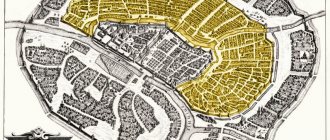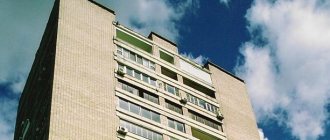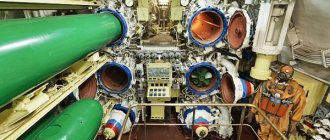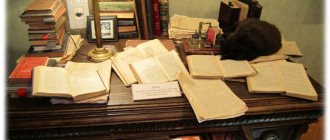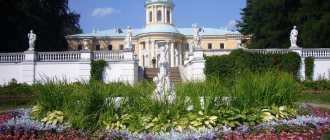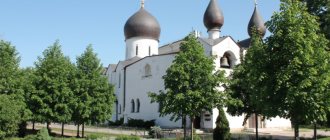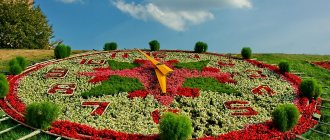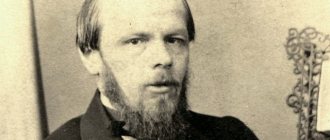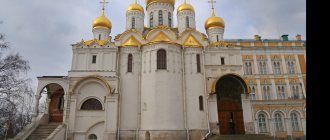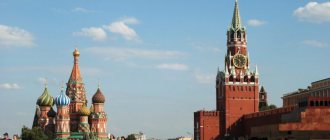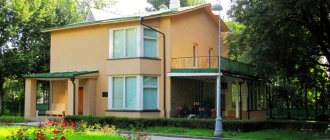In honor of the 100th anniversary of the birth of Sergei Yesenin, in 1995, a museum of the poet was opened in Moscow. The exposition, assembled by enthusiasts and professionals, was located at the address: Bolshoi Strochenovsky Lane, 24, building 2. It was at this address that S. A. Yesenin’s father lived his entire lonely life, separate from his family, and here the poet himself spent 7 years of his Moscow life. However, when the museum opened, the historical building itself did not survive: it burned several times in the 90s, and in 1995 it was rebuilt from bricks and covered with boards.
The total exhibition area of the museum is 70 sq.m.
In one of the halls, the decor of the poet’s residential apartment is recreated. In the memorial room, which has a glass wall, you can see authentic objects of the 20th century, as well as some things that belonged to Yesenin: photographs, letters and manuscripts. In another hall of Yesenin’s apartment museum in Moscow, various events are organized - excursions, lectures, master classes, concerts, exhibitions, interactive classes and film shows. You can view the event poster on the official website of the Yesenin Museum in Moscow.
The first branch of the Moscow Museum of the Poet is located in Chernyshevsky Lane (house 4, building 2), this place is also historically connected with Yesenin’s life: a literary and musical circle met in the house, to which Sergei Yesenin was involved since 1912. Now it is the Yesenin Center, which hosts exhibitions, performances, and poets’ events.
The second branch is the Yesenin Museum in Moscow on Klyazminskaya Street (house 21, building 2). This platform mainly specializes in lectures, excursions, and events for schoolchildren.
© Moscow State Museum of S. A. Yesenin
Prices in 2021
The Moscow Yesenin Museum can be visited for free by: children under 6 years of age inclusive, Moscow schoolchildren, university students, disabled children, orphans, WWII veterans and a number of other groups.
Every third Thursday of the month, free entry to the Moscow State Museum of S. A. Yesenin is provided for everyone.
There are also special prices for preferential categories of citizens: schoolchildren, students of primary and secondary vocational educational institutions, graduate students, pensioners, disabled people of group III, families with 3 or more school-age children.
Cost of viewing the permanent exhibition and temporary exhibitions:
- 300 rubles - for adults.
- 150 rubles - for preferential categories.
You will need to pay an additional 150 rubles for photography.
Inspection of the exhibition with an audio guide, as well as access to viewing rare video materials:
- 350 rubles - for adults.
- 250 rubles - for preferential categories.
Prices on the official website of the Moscow State Yesenin Museum
© Official group of the Yesenin Museum in Moscow VKontakte
Station-museum "Divovo"
Monument to S.A. Yesenin against the backdrop of the Divovo station-museum
The railway station in the Rybnovsky district of the Ryazan region is located closest to the poet’s homeland - the village of Konstantinovo. In 1912, seventeen-year-old Yesenin boarded a train here and set off to “conquer” Moscow. In memory of the famous fellow countryman, a monument to the poet was erected in front of the Divovo station.
A small permanent exhibition has been created at the station, which is dedicated to Sergei Yesenin. Almost all the exhibits came here from the Konstantinovsky Museum. In the windows you can see railway caps, train schedules from the beginning of the last century, a shiny samovar, kitchen utensils, old photographs, maps and documents.
Excursions to the Yesenin Museum in Moscow
The museum offers various types of excursions:
The sightseeing tour is organized for groups of 12 people or more. Price:
- 1,200 rubles - for Moscow schoolchildren using a Muscovite social card. An additional 100 rubles are paid for each visitor in excess of the established size of the excursion group.
- 1,200 rubles - individual excursion for up to 2 people.
- 3,000 rubles - for preferential categories.
- 4,200 rubles - for other visitors.
On a sightseeing tour of the Moscow State Museum of Yesenin, visitors will learn about the work of Sergei Alexandrovich, special attention is paid to his period of life in Moscow. Participants will hear the poet’s poems in the author’s reading, see original things that belonged to him, and watch rare newsreel footage of the last century. For excursions in a group of more than 6 people, advance registration is required by phone.
The Sergei Yesenin Museum in Moscow conducts free excursions for Moscow students every day, from June 1 to August 31, at 10:00, 12:00 and 14:00, no prior registration required.
Thematic excursions are called literary meetings “Your acquaintance Sergei Yesenin”. They are held for groups of 12 people or more. Various topics related to the life and work of the poet are offered. Cost of thematic excursions:
- 250 rubles - for preferential categories.
- 300 rubles for other visitors.
Combined programs “Big things can be seen from a distance!” is a combination of a sightseeing tour (20-45 minutes) with one more activity to choose from:
- Thematic excursion (45 minutes);
- Walking tour along Moscow's ancient alleys (45 minutes);
- Interactive program for children (1 hour) and master class (30–40 minutes).
Walking tours around Moscow to get acquainted with the history of streets and alleys. Duration - up to 2 hours. Price:
- 600 rubles - for discounted visitors;
- 700 rubles for other visitors.
You can view the schedule of walking tours on the official website of the Yesenin Museum in Moscow. To participate, you must register in advance by calling: 8-495-688-79-90, 8-495-954-97-64.
The Yesenin House-Museum in Moscow also organizes out-of-town historical and literary trips . Such trips introduce people to places associated with the life and work of various writers and poets. You must register for the excursion 7 days before departure.
© Moscow State Museum of S. A. Yesenin
Guide: Moscow Yeseninskaya
The “last poet of the village,” who turned 115 this fall, considered Moscow the best he had ever seen in his life. And the curved streets of the capital still remember his light gait. Here are just a few Yesenin addresses.
Moscow registration Moscow State Museum S.A. Yesenina
Guide: Mos. Source: Guide: Mos. Author: Guide: Mos In June 1911, having arrived in Moscow from the Ryazan village of Konstantinovo, the young poet went to his father. Alexander Nikitich Yesenin served as a clerk in the butcher shop of the merchant Krylov and occupied three whole rooms in the hostel, which was located in house number 24 on Bolshoi Strochenovsky Lane. It was here, in apartment 6 on the first floor, that Sergei Yesenin stayed. He quickly quarreled with his father and ran away from him, however, only to register in the house a year later until 1918. So the museum, opened in a former merchant’s hostel, is the poet’s only official Moscow address. To get there, you first have to pass through the office entrance - a wooden house is surrounded on all sides by private companies. The museum premises are almost microscopic - only 99 square meters. m. The memorial room is furnished with authentic objects from the beginning of the 20th century - alas, of the things that belonged to Yesenin himself, only the family icon of the Kazan Mother of God. The poet’s creative and life path is illustrated by wall display cases with photographs, manuscripts, and letters. Here you can see, for example, Yesenin’s international passport or a note requesting a meeting that the aspiring poet wrote to Alexander Blok.
Peasant poet Branch of the Museum S.A. Yesenina
Even inveterate Yesenin lovers are unlikely to know that quite recently the poet’s museum acquired a branch - a charming modern mansion not far from the Dostoevskaya metro station, in Chernyshevsky Lane. In general, the Bozhedomka area is one of the iconic Yesenin places. The poet’s friend Sergei Koshkarov lived here, with whom he spent the night a couple of times. Koshkarov was the chairman of the Surikov literary and musical circle, which united self-taught writers from the people. Yesenin joined this circle in 1913 and took a very active part in its activities. But two years later he left him with a scandal - the creativity of the peasant nuggets was too heterogeneous. Right next to it was the editorial office of the Parus magazine, where the poet was published, as well as the house of a familiar guslier who taught Yesenin to play the gusli. The branch's exposition will open only by 2012, but for now three exhibitions are operating here in test mode. One tells exactly about Yesenin’s Moscow, the other – about the poet’s relationship with Isadora Duncan. And the third is dedicated... to the 50th anniversary of human space flight. It turns out that Sergei Yesenin was the favorite poet of Yuri Gagarin and many other cosmonauts. So the manifestos of the Imagists stand side by side here with letters from Gagarin, and photographs of Yesenin’s friends stand side by side with maps of the starry sky.
"Yesenin's Mansion"
Guide: Mos. Source: Guide: Mos. Author: Guide: Mos
Those who have been to the building of the Theater of Nations will probably remember the large greenish apartment building on the right side of the entrance. It’s funny that in the ad of one real estate company it is advertised as “Yesenin’s mansion,” although in fact here, in house number 5 on Petrovsky (former Bogoslovsky) Lane, the poet rented three rooms in a communal apartment together with his friend and colleague Anatoly Mariengof. They lived “with one house, one money.” “Both were clean, washed, ironed” (at that time Yesenin had already exchanged his blouse for a tailcoat and a top hat) and in severe cold they slept on the same bed to keep warm. As Mariengof writes in his “Novel Without Lies,” Yesenin even offered one aspiring poetess a typist’s salary, if only she would come specially and warm the bed (and without any ulterior motive!). The poetess agreed, but after a couple of visits she angrily left, saying goodbye: “I didn’t hire myself to warm the sheets of the saints.”
Imagist friends
Guide: Mos. Source: Guide: Mos. Author: Guide: Mos
Yesenin and Mariengof, together with Vadim Shershenevich and Rurik Ivnev, in 1919 formed a group of imagists, whose credo was defined something like this: content is nothing, image is everything. The group became famous for its shocking antics (for example, for one night Tverskaya was “renamed” to Yeseninskaya), but was fashionable and commercially successful. In particular, Yesenin and Mariengof owned the bookstore “Artel of Word Artists”, or the Imagist Shop on Bolshaya Nikitskaya, 15 (the house to the right of the conservatory), as well as the cult poetic cafe “Stable of Pegasus” on Tverskaya, 37. Alas, today there is no sign of the cafe There are no traces left, but the building of the Shop is intact. It was opened with the permission of Lev Kamenev himself: at first the Imagists sold second-hand book literature there, and then they began to sell “their” publications. Sometimes Yesenin and Mariengof stood behind the counter themselves. Even in severe frosts, friends managed to buy firewood in order to somehow heat the store. It was very popular, and despite the hunger and cold, the number of buyers grew day by day.
"Divine Sandal"
Guide: Mos. Source: Guide: Mos. Author: Guide: Mos
House No. 10 on Bolshaya Sadovaya has a stunningly interesting history. Today it is best known for the “bad apartment” No. 50, where the Mikhail Bulgakov Museum is open. But besides this writer, the most amazing personalities stayed here at different times. For example, the well-known Fanny Kaplan lived here. Imagists, including Yesenin, often came here to visit the opera singer Evgenia Lvova, Shershenevich’s mother. In the early 20s, this house housed the studios of artists Pyotr Konchalovsky and Georgy Yakulov, where Yesenin first met Isadora Duncan. It happened on October 3, 1921. The “Divine Sandal” fell madly in love with a crazy boy, and the poet and dancer left Yakulov’s apartment together. According to legend, the path to Prechistenka, where Isadora occupied the mansion of General Ermolov (house no. 20), converted into a choreographic studio, was long. The driver fell asleep, the horse lost its way, and the carriage drove three times around the Church of St. Blaise, which is in Gagarinsky Lane. The translator who accompanied Yesenin and Duncan pushed the driver and laughed: “Hey, father, are you marrying us? You’re driving around the church, like around a lectern, for the third time!” Yesenin and Duncan burst out laughing, but the sign turned out to be correct - in May 1922, the poet and dancer actually got married.
Vagankovo
You can walk around the Vagankovskoye cemetery for hours, especially if you are armed with a guidebook, which is sold at the kiosk at the entrance. The poet himself, a year and a half before his mysterious death, buried his friend, the new peasant poet Alexander Shiryaevets, in the Leningrad Angleterre hotel on Vagankovo. Very close to the central alley, on the left side of the cemetery, Yesenin found his last refuge. Nearby lies the “faithful Galya” - the poet’s literary secretary, one of his many lovers and, perhaps, his most devoted admirer Galina Benislavskaya. She committed suicide at Yesenin’s grave in December 1926, leaving a note with the words “In this grave everything that is most dear to me” (by the way, this note can be seen at the exhibition in Chernyshevsky Lane). And in the neighboring plot, the brilliant actress of the Meyerhold Theater Zinaida Reich, the second wife of the poet, who was brutally killed by the NKVD in 1939, is buried. For 85 years now, the folk trail to the grave of Sergei Yesenin has not been overgrown - there are always a lot of flowers here and poetry is sung on Sundays.
Reviews of the Yesenin Museum in Moscow
Many visitors speak positively about the excursions and the enthusiastic guides who help immerse themselves in the world of the poet. On the other hand, there is often dissatisfaction with the fact that the space of the Moscow Yesenin Museum is very small, the number of exhibits is also small, moreover, among them there are quite a lot of copies, not originals. According to other travelers, a small space, on the contrary, creates a cozy and intimate atmosphere, and a small collection is thoughtful and capacious.
© Official group of the Yesenin Museum in Moscow VKontakte
Apartment of Yesenin and Mariengof in Moscow
View of house No. 5, building 9 on Petrovsky Lane; it contains the apartment in which Yesenin and Mariengof lived
On Petrovsky Lane in the capital there is a house whose residents know more than about its owners. From 1918 to 1923, Sergei Alexandrovich Yesenin lived here with his friend, the imagist poet Anatoly Borisovich Mariengof.
There was a sign on the door of their apartment: “Poets are working. Visitors are asked not to disturb."
The friends' life was simple. The young people occupied three small rooms. The steam heating in the house did not work. It was very cold in winter, but the owner of the apartment helped Yesenin and Mariengof with coal. Now the building houses a children's theater, and a memorial plaque with a bas-relief hangs on the facade.
| ← RUSSIA | EUROPE → |
How to get to the Yesenin Museum in Moscow
The museum is located in the Zamoskvorechye district. You can get there by public transport:
- Bus : No. M5, M6, 632, stop “Metro Serpukhovskaya”; No. T71, 41, 275, 700, 907, stop “Metro Dobryninskaya (terminal)”; No. B, K, stop "Bolshoi Strochenovsky Lane".
- Trolleybus : No. 8, stop “Metro Serpukhovskaya”.
- Tram : No. A, 3, 39, stop “Zatsepskaya Ploshchad”.
Moscow public transport schedule
Paveletsky Station is 1 km from the museum.
You can come to the Sergei Yesenin Museum by taxi: the services Yandex.Taxi, Uber, Gett, Maxim, and Taxi Vezet operate in Moscow.
Programs and events of the museum complex
The Yesenin Museum in Moscow regularly organizes events that can be considered among the cultural events of the capital. These could be poetry evenings, concerts, creative meetings with the participation of famous actors, musicians, and readers. Among today's most talented readers of S. A. Yesenin's poetry, experts name the name of Alexander Zlishchev. In November 2014, it was in his performance, accompanied by live music, that the heartfelt poems of the great Russian poet were heard in the house-museum.
Museum staff conduct lectures that touch on topics of citizenship, love, philosophical attitude to life and discuss many other issues. Among the activities developed by the museum are programs for children. The younger generation begins to get acquainted with Yesenin’s work from early school age. The poet himself, while still very young, said that his poetry would be understood and accepted by readers only after a hundred years. Now is the time when Yesenin’s poems are even more in demand than before.
The walking tours are interesting in their content, introducing both the poet’s work and the history of the places where he loved to visit in Moscow. The Yeseninsky courtyard on the territory of the house-museum will hospitably welcome guests and provide an opportunity to enjoy a relaxing holiday. One of the exhibitions tells about the poet Yesenin as a representative of world culture. His name is on a par with the names of outstanding figures of world-class literature.
Restoration work
In 2010, the government of the capital expanded the Yesenin Museum in Moscow - the institution was allocated an additional building on Chernyshevsky Street, house No. 4, which the poet visited several times in his time, since meetings of the Surikov literary and musical circle were often held there. The building dates back to 1905, so it requires repair work on the foundation, walls, and roof.
In 2014, design work began aimed at preserving the historical appearance of the mansion. It is planned to transform the State Museum of Sergei Yesenin in Moscow into a modern museum complex that will be able to receive many visitors. In addition, it is planned to create comfortable conditions for the institution’s employees for more fruitful scientific work within the walls of the house-museum. Today this building is already closed for reconstruction.
In 2015, the cultural community around the world will celebrate the 120th anniversary of the birth of Sergei Alexandrovich Yesenin. The museum has developed and is holding a number of comprehensive events dedicated to this significant date.
